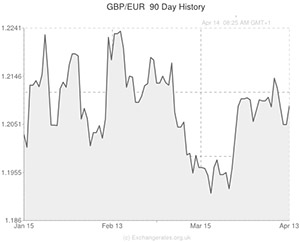
The Pound to Euro exchange rate (GBP/EUR) rallied by around a third of a cent to 1.2080 during the Asian session as traders reacted to a dovish set of comments from European Central Bank President Mario Draghi.
The ECB Chairman said that the Bank would introduce fresh stimulus measures if the value of the single currency continued to escalate:
“A strengthening of the exchange rate requires further monetary stimulus. That is an important dimension of our price stability”.
Draghi’s comments came as the Euro approached 1.3900 against the US Dollar (EUR/USD), which is very close to a 2.5-year high and is considerably higher than the long term average for the pair.
Draghi noted that the relative strength of the single currency is one of the reasons that inflation is running so low in the currency bloc. Eurozone CPI currently stands at a 4-year low of 0.5% – significantly lower than the ECB’s target of 2.0%.
Deflation is one of the key threats to the currency bloc at the moment; many economists and political leaders are worried that declining price pressures could lead to a period of stagnation whereby consumers start to defer purchases in the hope that goods and products will be available for cheaper prices in the future.
The ECB has repeatedly mentioned that it is willing and ready to unleash further stimulus measures, which has helped to dampen demand for the single currency slightly. However, it seems that investors are unwilling to send the Euro spiraling significantly lower until the European Central Bank actually announces fresh easing measures.
The 0.3 cent gains in GBP/EUR last night could have been more severe had the ECB set a target or a threshold for loosening monetary policy. As it stands markets appear reluctant to punish the Euro with any concerted force unless Mario Draghi and the Governing Council either: cut the benchmark interest rate, push the deposit rate down into negative territory or announce a plan to start purchasing Eurozone government bonds.
The Sterling to Euro exchange rate (GBP/EUR) struck a yearly high of 1.2257 back in February, but it is unlikely that the Pound will breach that level again without a fresh bout of ECB stimulus.
Later this week the UK Consumer Price Index is predicted to slide form 1.8% to 1.6%, which could weaken demand for Sterling. However, the Pound could perform better if the latest Unemployment Rate shows a drop in joblessness below the market forecast of 7.1%.

Comments are closed.